The most effective social media content isn't hastily written and posted.
Great social content takes time and effort to craft, just like any other piece of writing.
But I get it. You're not a master copywriter.
That's ok!
If you know your content needs editing, but you're not sure how to proofread... here's your answer.
9 social media best practices that will help you write better content in no time.

9 Social Media Best Practices to Help You Write Better Content
1. Don't cut characters
If you're writing for social media, the temptation is to cut out characters to shorten your post.
It's likely that you've seen and even used some of the most popular internet acronyms.
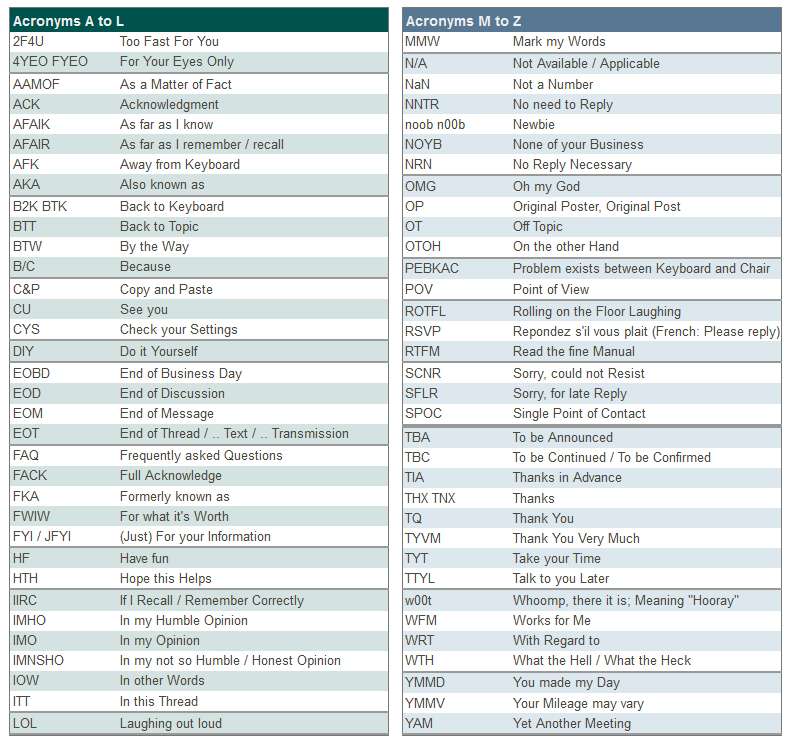
And while that might be ok when you're posting as an individual, it can look unprofessional as a business. It can even stop potential buyers cold in their tracks.
Imagine seeing a post from a company you respect. They've written:
"We have an amazing offer 4 u!'"
The use of 4, as opposed to "for," makes it feel as if they hurriedly wrote that post.
If they want to earn your business, that sentence should read, 'We have an amazing offer for you!'
You may feel that writing in this way is overly formal, but in fact many social media users prefer it.
As we move further away from "text speak," and closer to long form sentences, it's important that you write in a conversational and natural way.
2. Make grammar your priority
Excellent grammar is a priority whatever you're writing online, and that includes your social media posts.
Yes, social media is a less formal media than your other marketing methods, but your grammar really does have to be impeccable.
Why?
It comes down to professionalism again. Taking the time to ensure that you're using good grammar means that you care about the reader's experience.
Good grammar creates the building blocks of good writing. If you take care of your grammar, it's much easier to understand and appreciate what you're writing.
For example, good grammar includes being concrete on what you're saying, rather than using vague language.
Can you tell the difference? The first one uses active voice where the subject (the weather), performs an action.
Another example, "We have a great offer in our store today." Sounds better and is grammatically correct, rather than - "There's a great offer in the store today."
Being active rather than passive makes your writing dynamic.
Another good tip is to cut any unneeded words from your copy. You want your writing to flow, and get to the point as quickly as possible. A great tool for this is Hemingway.
Just drop your copy in to see where you're using passive voice, too many adverbs, or if your copy is too hard to read.
As you proofread, pull out any words that don't serve to further your point. It's surprising how many words you can actually cut from your copy in this way.
Afterwards, you'll have short, snappy copy that'll grab your reader's attention.
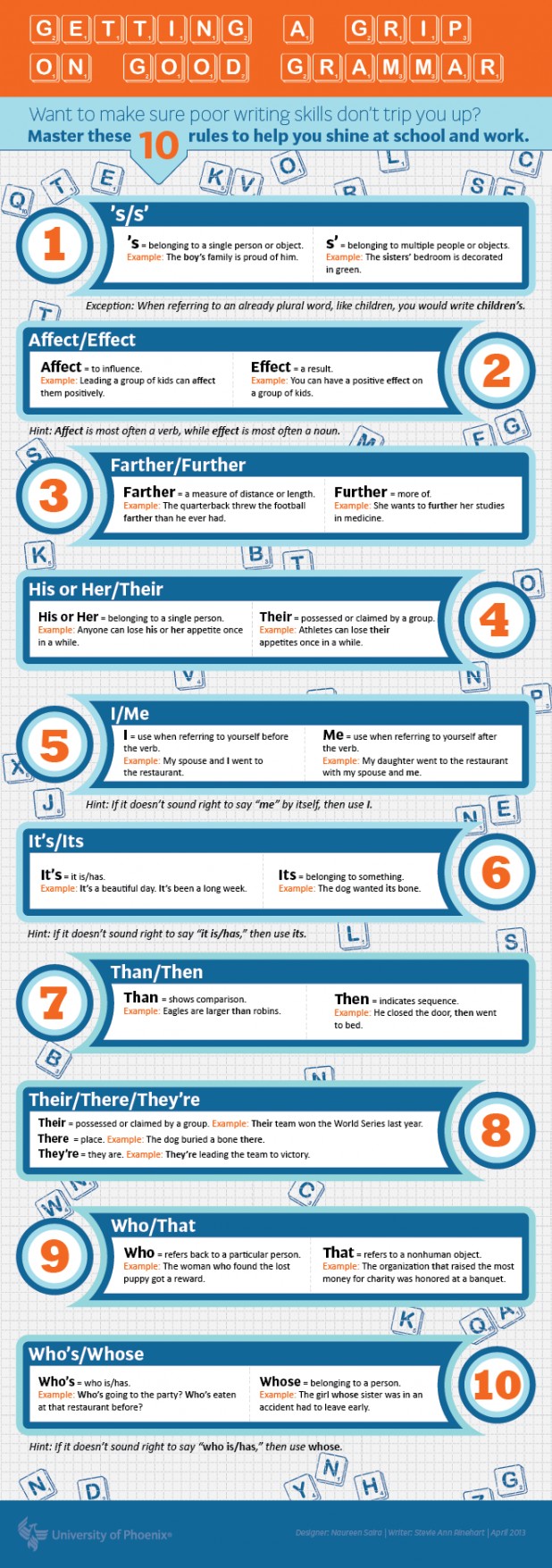 Source: visually
Source: visually
3. Know your homophones
Spell check is a great invention. You can do an initial sweep for spelling errors, and help you correct them in a click of a mouse.
However, that's what it should be; an initial sweep.
Don't rely on your spell check to do everything. Homophones can crop up in your writing.
They're easy to miss , and you might not even know they're there.
Why?
Because homophones are sneaky, and spell check will miss them entirely.
A homophone is a word that sounds the same as another word, but is spelled differently.
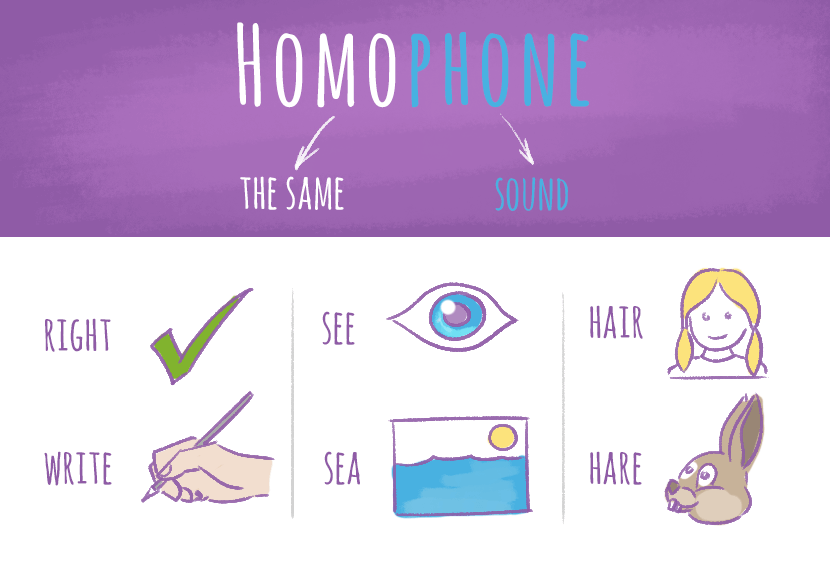
Take this sentence for example: "If you want to buy, please precede to this website.'"
It sounds ok, but the word 'precede' is wrong. The sentence should read , "If you want to buy, please proceed to this website."
It's a tiny change, but it makes all the difference.
The only way to stop this from happening is to proofread your work carefully to weed out any homophones you find.
4. Don't '!!!!!!'
Ever see those stores that have huge neon signs in the windows, that read something like, "EVERYTHING MUST GO!!!!!"
They're not exactly promising, are they? If you head into that store, you're only going to find discounted goods that no one else wanted.
Now, imagine how it looks if a company uses similar tactics on social media.
If you use lots of exclamation points or other non standard punctuation, it can give off the same effect.
You'll look as though you don't respect the reader's time, and that you're not selling the quality product that you're actually trying to show off.
Instead, use your language to describe how exciting your offer is. For example, instead of writing, "Check out this amazing offer!!!!'," you could say, "We're offering this product at half price for today only. Come check it out while it's still in stock!'"
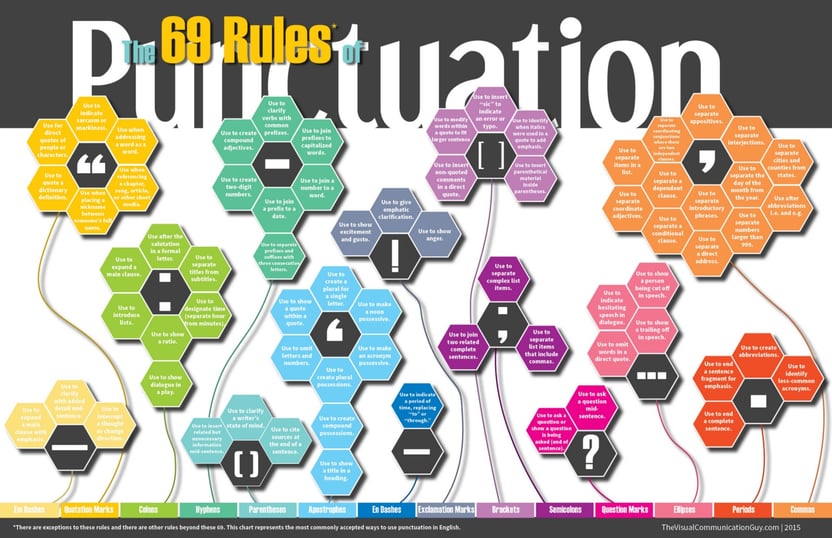 Source: Electric Literature
Source: Electric Literature
5. Read every post aloud
Once you've finished writing your post, you need to start proofreading it. When proofreading, the best way to do so it to read it out loud.
Why is this?
Because it forces you to look at your post from a different perspective.
You can read from the computer screen over and over, and you can still keep missing the same mistake over and over again.
If you read the piece aloud though, you're forcing your brain to look at it differently. That way, you're sure to find any errors that you've made.
Another way of doing this is to print the post off, and come back to it a little while later.
Like reading it on paper, you're doing the same thing where you're giving yourself a different perspective on what you've written.
Even just seeing it in a different medium can do a lot for your writing.

6. Use online tools
Online tools are an amazing and inexpensive way to ensure that your posts are being proofread properly.
If you're not using them already, they're a proofreading tool that you really can't be without.
They can check spelling and grammar, pick up issues that you may have missed, and even put you in touch with other writers who can help you out.
Here's some of the best tools out there that you can use right now.
- 1 Checker: This free to use spell checking tool will highlight and help you correct any errors in your posts. Just paste your work into your tool and you're almost done.
- Academized: This tool is a fantastic grammar checker, and picks up issues that you may have missed. Best of all, it's free to use.
- Cite It In: Use this tool to ensure every source you use in your writing is properly cited.
- Grammark: This tool will pick up on some issues that other proofreaders can't. For example, it can help you fix run on sentences and instances of the passive voice.
- Paper Fellows: This writing community is one of the best places to go if you want help with your proofreading.
- Assignment Help: This writing community is the place to join if you want to improve your writing.
- After The Deadline: This proofreading tool will help you pick out any spelling or grammatical errors that you may have missed.
7. Check confusable words
This is another lesson in not trusting your spell check feature. Confusable words are words that sound and look very similar, but don't mean the same thing.
It's very easy to mix them up when you're writing, and not even notice that you've used them.
If you miss them and post on social media though, it can look bad that you overlooked important details.
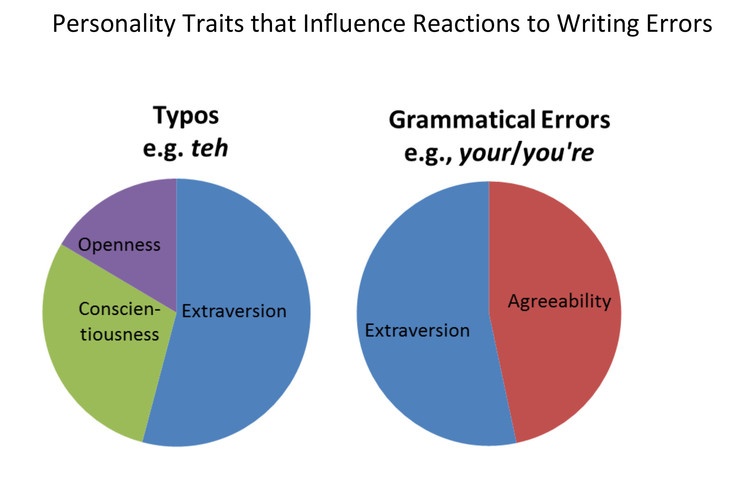
For example, look at this sentence: "Our manger will handle all the details."
Clearly, the writer means that the manager will handle the details, but by missing out on one letter, they've made a serious error in the sentence.
To avoid this from happening to you, you need to read your post carefully before it goes online.
Even better, have someone else read it for you.
There's a few benefits to using this technique. If you pick someone who you trust to give you an honest answer, they'll tell you exactly what needs to be fixed, and how.
It will also help you improve as a writer, giving you the skills to write even better copy in the future.
8. Find supporting references and resources
This is an incredibly important step and one you can' afford to skip.
Your social media posts reflect on you, just like your website and any other writing does.
This means that if you're going to write, make sure you back up your points with sources and references.
It's worth knowing that using sources will slowly grow your SEO results, as readers find you through these sources.
And citing your sources means that you're being clear about where you got your information. The internet is becoming less like the Wild West these days, but plagiarism is still sadly rampant.
Citing where your sources came from gives you more credibility, and shows that you're above board as a writer and as a company.
9. Make sure all of your content is copyright free and legal for use
Finally, ensure that all the material you use in your posts is free and legal to use. You may not think anything of grabbing that photo from Google Image Search, or that video from Youtube.
But I urge you, as a writer and a business - DON'T do it.
If you post content without credit, you're taking credit. The best way to avoid landing in hot water is to source your content from Creative Commons sites.
It's amazing how much is out there these days, so keep yourself safe.
Use a creative commons site and make sure to abide by their licensing requirements.
Conclusion
As you can see, there's much more to proofreading your social media posts than you thought.
It may "just" be social media, but it's something that thousands of people might read every day.
That's why your writing has to be at its absolute best.
Follow these writing tips, and you'll be ready to take on the competition online.



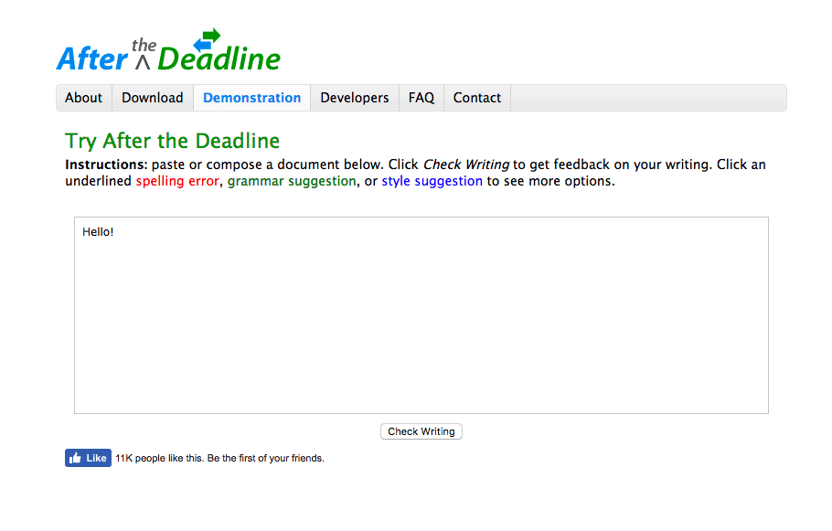






ViewHide comments (9)